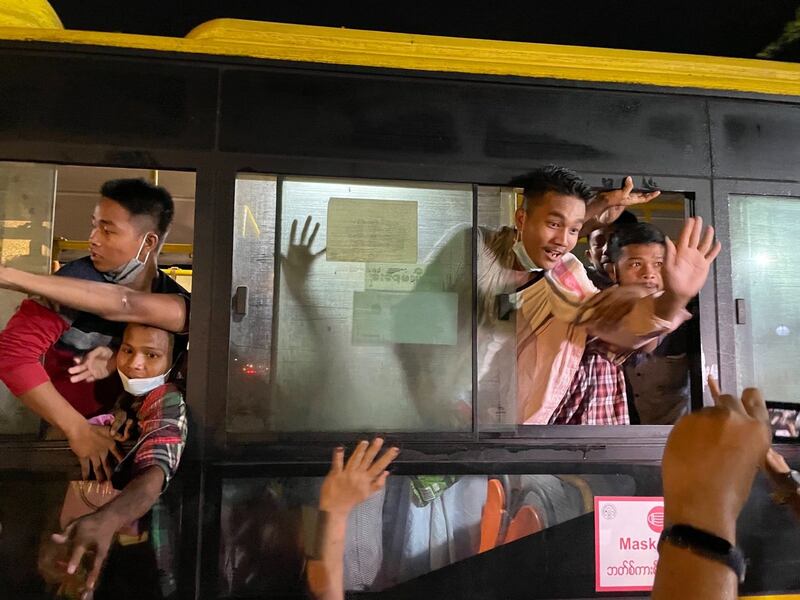Detainees who’ve endured torture and other forms of abuse at the hands of Myanmar’s junta security forces say they suffer from severe depression and mental illness long after their release and live in constant fear of rearrest.
Thousands of people have been arrested since the military seized power in a Feb. 1 coup. Detainees who have been released told RFA’s Myanmar Service that the experience left them severely traumatized.
The former detainees, who are mostly young and were taken into custody after joining anti-junta protests, say they are haunted by their experiences in captivity and are no longer able to enjoy a normal life despite having been allowed to return home.
Ko Thaw, a 20-year-old man from Myanmar’s largest city Yangon, told RFA that he had been arrested on March 3 for joining a protest and released three weeks later. On March 24, the same day that he was set free, authorities came to his home in the capital Naypyidaw and rearrested him, accusing him of “defamation” against the military.
Later released as part of a general amnesty on Oct. 18, Ko Thaw said that he was beaten severely while he was being interrogated about his alleged crimes.
“They tore my shirt off … and then hit me on the chest and arms with batons. When I covered my face, about 15 of them beat me all over my body, kicking me in the neck and back,” he said.
“They hadn’t even questioned me about anything yet. They just beat me up.”
Over the next few days, he said, his captors grilled him about his “connections” and tried to link him to other crimes he had not committed.
“Later, while in prison, I saw some men with deep cuts to their necks who had been there for about a month but for some reason were never given any medicine,” he said. “I did not suffer as much as they did, but it upset me terribly.”
Ko Thaw said he is restless and always afraid.
“I can’t eat or sleep well because I am constantly wondering, ‘when will they come back for me,’” he said.
“Sometimes, when I want to do something as simple as go out shopping, my thoughts haunt me, and I question whether I will be safe.”
Yin Yin, 24-year-old pro-democracy activist from Yangon, was also arrested on March 3 for participating in a protest and detained in Insein Prison on defamation charges before being released as part of the Oct. 18 amnesty.
She told RFA she lives in “constant fear” that she will be arrested again.
“Since my release from prison, I feel so insecure. ‘If I go somewhere, who might be following me? Will it be safe to go there,’ I often ask myself,” she said.
“As there have been several cases of rearrests, I worry all the time that they will come after me. … Even though I’m at home now, I don’t feel like it at all. When I wake up in the mornings, it takes some time before I realize that I’m in my own bed. I still have nightmares as if I am still in prison.”
Ko Thaw and Yin Yin told RFA that after more than eight months in prison they are both dealing with debilitating anxiety but have no one to turn to for help.

Mental and physical torture
Nang Lin, a member of Takatha Students Union, said that detainees experience various forms of abuse during interrogation that continues to traumatize them after being released.
“They are mentally tortured by their captors, who interrogate them about things that have nothing to do with the charges against them. It is inhuman,” he said.
“Women are often sexually harassed. Men are asked personal questions about their sex lives. These kinds of questions are meant to damage their psyche.”
Other detainees will bear the marks of physical torture long after they are freed.
Last month, prominent Myanmar political activist Kyaw Min Yu, better known by his alias Ko Jimmy, was left in critical condition after suffering a head injury while being arrested in Yangon. After three days of intensive care at a military hospital, he was transferred to an undisclosed location, according to Myanmar Now.
At the time, his wife Nilar Thein told RFA that she was “expecting the worst-case scenario” because he was in the custody of junta soldiers.
“We have seen in the past that many people who were arrested either died or were left with serious lifelong trauma because they were severely tortured,” she said. “We have prepared ourselves for everything, mentally as well.”
Kyaw Min Yu is the former leader of the so-called 88-generation group of students, which led the August 1988 uprising against the previous military regime that had run Myanmar since 1962. He was accused by the current regime of defamation in February. He now faces six new charges, including high treason and terrorism, for allegedly planning attacks on junta targets.
Dr. Tin Oo, a psychiatrist, told RFA that people who endure abuse in custody should seek out professional care to help them deal with the anguish they often must deal with long after being released.
“People with these kinds of experiences can suffer extreme mental trauma and if this happens, they should see a counseling expert when they are freed from prison,” he said.
“Only you know what you are dealing with, so go see an expert when you are haunted by these experiences.”
Nine months after the Feb. 1 coup, security forces have killed 1,253 civilians and arrested at least 7,144, according to the Bangkok-based Assistance Association for Political Prisoners. Many of the deaths and arrests have occurred during crackdowns on anti-junta protests.
Reported by RFA’s Myanmar Service. Translated by Khin Maung Nyane. Written in English by Joshua Lipes.
